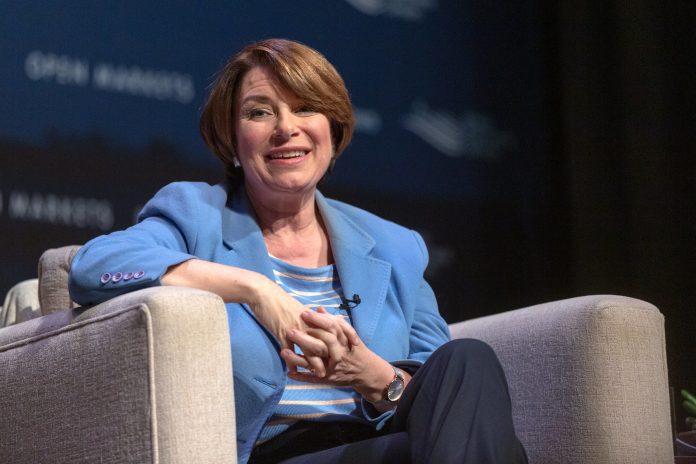Last Thursday ten candidates for the Democratic nomination for President gathered on stage for a debate. While it is impossible to say anything definitive about who won that debate, there are some important takeaways, some of which have been overlooked. The first, and most obvious, is if you were looking for somebody to run a country, a state, a city or a youth sports team, organize a social event or simply get dinner on the table for the family at the end of a long day, you would take any of those ten candidates over the current occupant of the White House. All ten of the candidates were, in contrast to Donald Trump, clearly intelligent, well-spoken, serious about governance and mentally healthy. In addition to this rather obvious finding, there are some more interesting takeaways from the debate.
First, multi-candidate races are difficult because candidates interact with each other in complicated ways. For example, Amy Klobuchar the moderate Democratic Senator from Minnesota, spent much of the debate parrying with more progressive opponents like Bernie Sanders and Elizabeth Warren. This made sense because Klobuchar has some concrete policy differences with the two leading progressives. However, Klobuchar’s path to the nomination has little to do, at this stage, with Warren and Sanders. The only way Klobuchar has a shot at the nomination is if moderate frontrunner Joe Biden stumbles, but Klobuchar barely engaged with Biden during the debate. Klobuchar’s drumbeat of moderate and cautious politics may have hurt Sanders and Warren, but it may have also helped Biden who is currently seen as the only moderate in the race who can stop Sanders and Warren.
Another example of this is Julian Castro who, like Klobuchar, is an impressive candidate with a sterling resume. Castro attacked Biden from the left while implying Biden was too old for the job early in the debate. While Castro’s attacks landed and may have damaged Biden, they also damaged Castro who was seen as beating up on the nice old man. Castro, who had little chance of being the nominee before the debate, probably hurt his chances by going after Biden. However, by weakening Biden he helped other candidates including Warren, Sanders and even Kamala Harris.
A second takeaway from the debate is that the choice between more progressive candidate, like Warren or Sanders, and a more electable candidate like Biden, is a false one. The theory of the white male insider as the most electable candidate has always been unproven or simply wrong, but what Biden showed us last Thursday night was a candidate who, despite being essentially an amiable liberal Democrat, is simply not up for the race. Biden’s garbled closing statement, and the racial politics suggested by that statement demonstrate that Biden is not the politician he once was-and that he is not in touch with the gestalt of today’s Democratic Party or of the electorate more broadly. The speed with which some in the Democratic establishment rushed to Biden’s defense showed that they are worried too. However, anybody who saw how Biden handled attacks from Castro, should be very concerned because Trump will also attack Biden-if he is indeed the nominee-for his age, while Moscow will seek to undermine Biden’s support among African American voters. However, Trump will hit the former vice-president very hard on the doings of his son Hunter in Ukraine, an issue that the other Democratic candidates have not yet touched. That issue could easily become Biden’s Benghazi.
The race now looks like one where the frontrunner is flawed and perhaps out of touch ideologically with both the Democratic Party and a majority of the American people, but also where second tier candidates are struggling to break through in such a crowded field, and where the progressive vote is largely split between Sanders and Warren
The debate also demonstrated just how much has changed in the Democratic Party, and in American opinion more broadly over just the last decade. Joe Biden took the conservative position at the debate on Thursday, but if he had said that on the debate stage in 2008, when he sought the Democratic nomination, he would have been considered on the left wing fringe of the health care debate. Similarly, while some criticized Beto O’Rourke’s propsoal for mandatory buybacks of assault weapons on the grounds that would hurt moderate Democratic members of Congress seeking reelection, ten years ago even an optional buyback program would have been considered kind of radical for a major Democratic politician. Despite what some on the right say, proposals like O’Rourke’s on guns, and Sanders’ and Warren’s on health care and education are no longer out of the mainstream and, in fact, are supported by substantial numbers of Americans.
These debates have a modest impact on the nominating process because there are so many debates and because the first votes will not be cast for more than four months, but debates provide some insight into the state of the race and what we might see in the coming months. The race now looks like one where the frontrunner is flawed and perhaps out of touch ideologically with both the Democratic Party and a majority of the American people, but also where second tier candidates are struggling to break through in such a crowded field, and where the progressive vote is largely split between Sanders and Warren. Some of this may sort itself out in the next few months, but the large and impressive field, could make this a long primary season.
www.lincolnmitchell.com
Follow me on Twitter at http://twitter.com/LincolnMitchell

